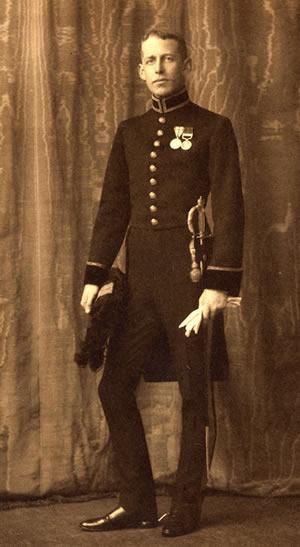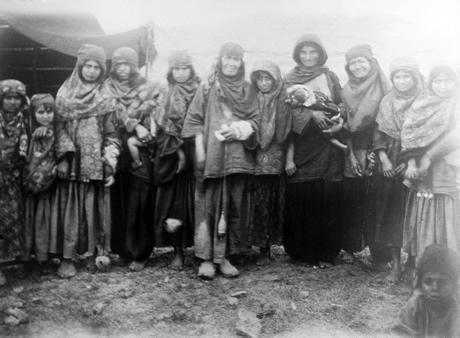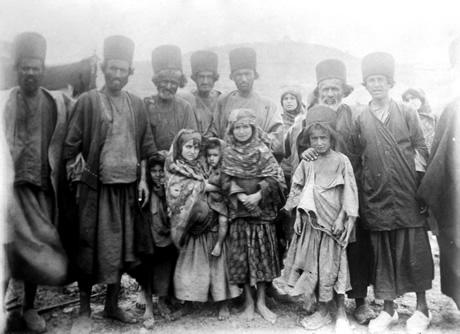 Above: DLR Lorimer was originally in the colonial service in India, before he was posted to Persia. Here he is, in 1909, shortly after his renegotiation of the key 1905 oil agreement. (This image is reproduced with the kind permission of Christina Lorimer, DLR Lorimer’s grand niece). Above: DLR Lorimer was originally in the colonial service in India, before he was posted to Persia. Here he is, in 1909, shortly after his renegotiation of the key 1905 oil agreement. (This image is reproduced with the kind permission of Christina Lorimer, DLR Lorimer’s grand niece). |
Bakhtiari poetry has been described as “revealing the real interests and outlook, and something of the experiences, of the Bakhtiari people”.
David Lockhart Lorimer worked with the Bakhtiari when he was Vice-Consul of Arabistan (1903-1910). He was an important ally for the first oil explorers and successfully renegotiated the key 1905 agreement. He and his wife Emily, a trained linguist, were all too aware of what peril a community faced if they lost sight of their mythological traditions, and they were keen to record traditional Bakhtiari poetry and prose tales.
‘Lock’ wrote that poetry was the “genuine product of the Bakhtiari mind” and that it owed nothing to any other poetic conventions.
This section of the website includes some poems translated by the Lorimers. ‘Lock’ was also a sensitive photographer, and captured rare images of ordinary Bakhtiari men, women and children engaged in daily life, more of which can be seen if you click here.
One of the poems here describes some people and events documented by Henry Layard, when he lived and fought with the Bakhtiari in 1841 before he went on to ‘discover’ Nineveh.
Layard vividly described the effect which poetry had on Bakhtiari warriors. When the wonderful exploits of Rustam in the Shahnameh were described: “how with one blow of his sword he cut horse and rider into two, or alone vanquished legions of enemies – [the warriors’] savage countenances became even more savage. They would shout and yell, draw their swords, and challenge imaginary foes”.
But when they listened “to the moving tale of the loves of Khosrau and his mistress, they would heave the greatest sighs – the tears running down their cheeks – and follow the verses with a running accompaniment of ‘Wai! Wai!’. The Chahar Lang leader, Mehmet Taki Khan, was just as susceptible as “his wild followers”. Layard wrote of how he saw the chieftain “cry and sob like a child as he recited or listened to some favourite verses”. And when Layard “expressed to him my surprise that he, who had seen so much of war and bloodshed, and had himself slain so many enemies, should be moved to tears by poetry, he replied, ‘Ya, Sahib! I cannot help it. They burn my heart!’.”
To learn more about Bakhtiari poetry click here.

Above: Photographs of ordinary people – especially women – were rare in 1906, when these lantern-slide images were taken. The spindle one of the women is holding is very similar to those still used today. (This image is reproduced with the kind permission of the SOAS library).

Above: These men are from the Bahmehi tribe, near Marmatain. They are wearing their wide, formal black overtrousers, and the traditional felt hats – both are still worn today, although the hats are now rounder in shape. (This image is reproduced with the kind permission of the SOAS library).
References
For some of Lorimer’s ideas about the Bakhtiari and their poetry, see:
- Lorimer, DLR 1954 “The Popular Verse of the Baḵẖtiāri of S. W. Persia –I”, Bulletin of the School of Oriental and African Studies, Vol. 16, No. 3 pp. 542-555
All of the poems quoted here, with the original Bakhtiari language version and additional detailed notes, are in:
- Lorimer, DLR 1955 “The Popular Verse of the Bakhtiāri of S. W. Persia –II: Specimens of Bakhtiāri Verse”, Bulletin of the School of Oriental and African Studies, Vol. 17, No. 1 pp. 92-110
- Lorimer, DLR 1963 “The Popular Verse of the Baḵẖtiāri of S. W. Persia –III: Further Specimens” Bulletin of the School of Oriental and African Studies, Vol. 26, No. 1, pp. 55-68
For more of an idea of the Lorimer’s as fascinating human beings:
- Lorimer, EO 1939 Language Hunting in the Karakorum, George Allen & Unwin, London (reprinted 2008: Pilgrims Book House)